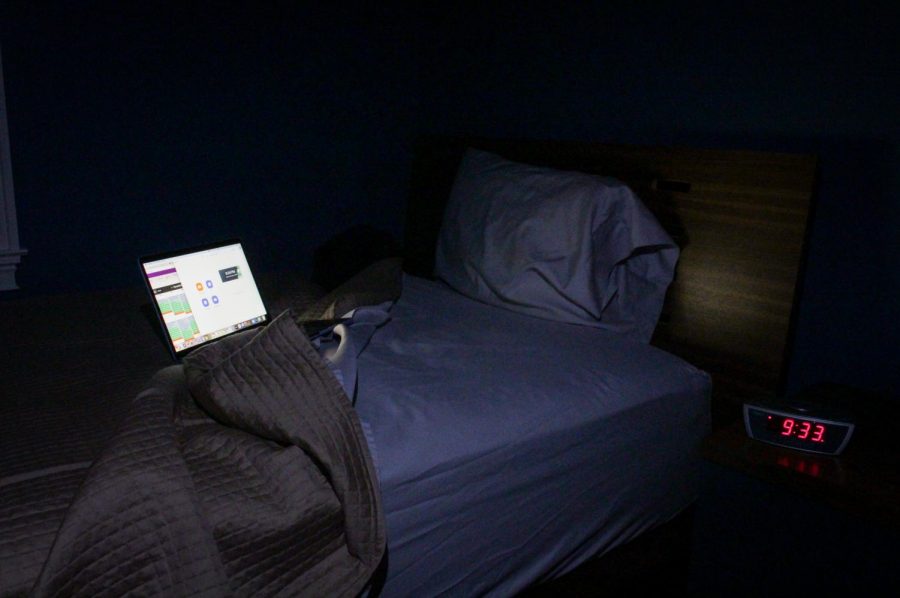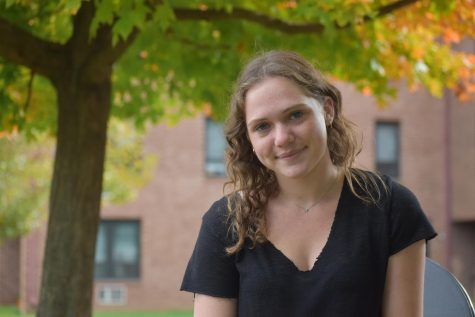Remote Academy amplifies student social divide
For many international students, this is their new classroom – in the middle of the night between high thread count sheets. The time difference for many has made attending classes and staying connected with the Masters community difficult.
November 18, 2020
It’s 2:00 a.m. and senior Alex Wang sits slumped over in his desk chair, yawning and staring bleary-eyed at his illuminated laptop screen. Wang lives in Shanghai, China, which has a 13-hour time difference from Dobbs Ferry. Some of Wang’s classes and community social events coincide with his sleeping schedule, meaning he rarely attends classes past midnight, and instead goes to early morning make-up sessions.
Wang, a former boarding student, along with 43 other students, has joined The Masters Remote Academy for the start of the academic year.
Designed to accommodate the unique needs of students not returning to campus, The Remote Academy specializes in the educational experience of overseas Upper-School members and strives to create an inclusive virtual community of students. The Academy aims to enable students, especially those in different time zones, to receive the same quality of education as those who are attending live classes.
The program is led by Dr. Robert Fish and is staffed by other Masters faculty members.
Fish said, “From a health point of view, we want to make it as easy as possible for students to go to bed at a semi reasonable hour while still having their academics taken care of.”
Students in the Academy are expected to attend all period one and two classes, but after that, they are excused from any classes that begin after midnight in their time zone. If they make the decision to miss those classes and go to bed, they are expected to both watch the class recording and attend the small group make up session.
Because school is about social interaction as well as academics, for ninth graders and other new students, the Academy experience includes various opportunities for creating and maintaining friendships, as well as integrating the remote students into the larger Masters community in Dobbs Ferry.
The most popular meeting opportunities for remote students to engage with the Masters community are run by the residential life program and clubs or performing groups. Dorm proctors have been planning and leading activities with the boarders and dorm parents every two weeks this fall.
As Co-President of International Club, Wang has worked to plan and facilitate club meetings that will allow new and international students to develop friendships, engage with a portion of the larger community, and expand their social reach. The club recently hosted a virtual karaoke meeting, which was widely attended by students across all grades, and featured a standout performance of John Denver’s “Take Me Home, Country Roads” by Fish.
According to Fish, the social scene for remote students thus far has been difficult, despite measures to create an engaged virtual environment.
“The ninth graders hadn’t met each other before, so to form a full community of kids who had not met each other yet is a struggle.”
Fish called the biggest challenge the academy has faced thus far “trying to balance creating [social] opportunities without creating additional obligations is a tough balance to strike,” he said.
Wang, a peer leader, echoed this sentiment, when describing his experience and those of the students in his peer group.
“When an event is mandatory, the students’ willingness to participate is going to decrease. A lot of the regular school-led activities are in a time zone that is unfavorable to many international students,” he said.
Nonetheless, time difference continues to create barriers between the domestic and international communities. Club meetings and social events for students in Eastern Standard Time are inconvenient for many international students, and result in those students feeling particularly disconnected from those on campus.
Disconnection is also exacerbated by the separated cohorts of students in the academy. As described by Wang, the new international students tend to have classes with other Chinese students, preventing them from meeting and getting to know many of the domestic students.
Zhou said, “I have to admit, I think it is really difficult for me to attend the virtual events run by Masters, because they are in the local time and that is really late or midnight here.”
In the hopes of improving the social experience of international students, the Masters Remote Academy faculty plan on meeting with some students to discuss potential ideas and suggestions as to how to provide more social support.
“It is really important that they can have some connection back to Dobbs Ferry as much as possible,” Fish said. “We want them to feel like they are a part of the bigger Masters School.”




